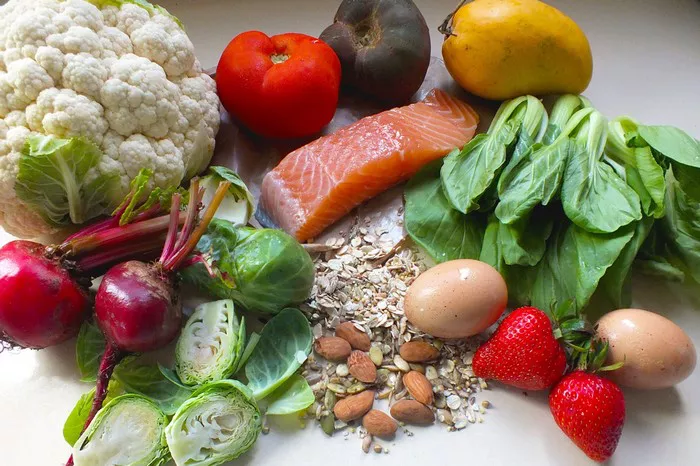The saying “you are what you eat” holds profound truth when it comes to maintaining a healthy lifestyle. The foods we consume play a crucial role in influencing our overall well-being. In this article, we will explore eight of the best foods that offer a myriad of health benefits, from supporting immune function to promoting heart health and enhancing cognitive function. These nutrient-dense powerhouses are not only delicious but also contribute to a balanced and nourishing diet.
Blueberries:
Blueberries, often referred to as “nature’s candy,” are not only sweet and delicious but also packed with essential nutrients. These tiny berries are rich in antioxidants, particularly anthocyanins, which have been linked to numerous health benefits. Antioxidants help combat oxidative stress in the body, reducing inflammation and supporting the immune system. Additionally, blueberries are a good source of vitamins C and K, as well as manganese. Incorporating a handful of blueberries into your daily diet can contribute to improved cognitive function, heart health, and overall well-being.
Salmon:
Salmon is a fatty fish that stands out as a nutritional powerhouse. It is an excellent source of omega-3 fatty acids, specifically EPA and DHA, which are crucial for heart health. These fatty acids have been associated with a reduced risk of cardiovascular disease, improved cognitive function, and even mood regulation. Salmon is also rich in high-quality protein, B vitamins, and minerals such as selenium and potassium. Including salmon in your diet at least twice a week can contribute to a well-rounded and heart-healthy nutritional profile.
Leafy Greens:
Leafy greens, such as kale, spinach, and Swiss chard, are nutritional powerhouses that offer an array of vitamins, minerals, and antioxidants. These vegetables are particularly rich in vitamin K, vitamin A, and folate. The high fiber content in leafy greens supports digestive health and helps maintain a healthy weight by promoting a feeling of fullness. Additionally, the antioxidants present in leafy greens help protect cells from damage, reducing the risk of chronic diseases. Whether incorporated into salads, smoothies, or sautéed as a side dish, leafy greens are a versatile and essential addition to a nutritious diet.
Quinoa:
Quinoa, often referred to as a “superfood,” is a gluten-free grain that provides a complete source of protein, containing all nine essential amino acids. In addition to its protein content, quinoa is rich in fiber, vitamins, and minerals, including magnesium, potassium, and iron. The complex carbohydrates in quinoa provide sustained energy, making it an excellent choice for maintaining blood sugar levels. As a versatile grain, quinoa can be used as a base for salads, a side dish, or even as a substitute for rice, contributing to a well-balanced and nutrient-dense diet.
Avocado:
Avocado, often hailed as a nutrient-dense fruit, is an excellent source of healthy monounsaturated fats. These fats are heart-healthy and have been associated with improved cholesterol levels. Avocados are also rich in potassium, which plays a crucial role in maintaining healthy blood pressure levels. Additionally, avocados provide a variety of vitamins, including vitamins K, E, C, and several B vitamins. Incorporating avocados into your diet adds a creamy texture to dishes while contributing to overall heart health and well-being.
Nuts and Seeds:
Nuts and seeds, such as almonds, walnuts, chia seeds, and flaxseeds, are nutritional powerhouses that offer a diverse range of health benefits. These plant-based sources of protein are rich in healthy fats, fiber, vitamins, and minerals. Nuts, such as almonds, provide vitamin E and magnesium, supporting skin health and bone health, respectively. Walnuts, high in omega-3 fatty acids, contribute to heart health and cognitive function. Chia seeds and flaxseeds are excellent sources of omega-3 fatty acids and fiber, promoting digestive health and reducing inflammation. Including a variety of nuts and seeds in your diet adds texture and flavor while providing essential nutrients.
Greek Yogurt:
Greek yogurt is a nutrient-dense dairy product that offers a substantial amount of protein, probiotics, and essential vitamins and minerals. The protein content in Greek yogurt helps promote satiety and supports muscle maintenance and repair. Probiotics, often present in yogurt, contribute to a healthy gut microbiome, which is crucial for digestion and immune function. Additionally, Greek yogurt is a good source of calcium, vitamin B12, and phosphorus, supporting bone health and overall well-being. Enjoying Greek yogurt as a snack, breakfast, or ingredient in various dishes can contribute to a balanced and nutritious diet.
Broccoli:
Broccoli is a cruciferous vegetable that deserves a place on your plate for its impressive nutritional profile. Packed with vitamins, including vitamin C, vitamin K, and folate, broccoli provides essential nutrients that support immune function, bone health, and cell division. It is also rich in fiber, promoting digestive health and aiding in weight management. The presence of antioxidants in broccoli, such as sulforaphane, has been linked to potential anti-cancer properties. Whether steamed, roasted, or added to stir-fries, broccoli is a versatile and nutritious vegetable that can enhance the nutritional value of your meals.
Conclusion:
Incorporating these eight nutrient-dense foods into your daily diet can have a profound impact on your overall health and well-being. From the antioxidant-rich blueberries to the heart-healthy salmon and the versatile quinoa, these foods offer a diverse range of essential nutrients that support various bodily functions.























